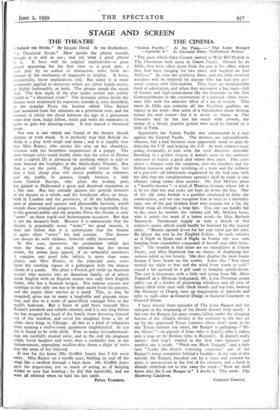STAGE AND SCREEN
THE THEATRE
" Behold the Bride." By Jacques DevaL At the Shaftesbury. " A Theatrical Event." How quaint the phrase sounds, though it is still in use ; and yet what a good phrase it is. It bore well its original implications—a great player appearing for the first time in a great part, a new play by an author of distinction, some fresh de- parture in the mechanics of stagecraft or display. It bears, occasionally, those implications still. But today it is more commonly applied to occasions which are either highly exotic, or highly fashionable, or both. The phrase stands the strain well. The first night of the play under review was widely hailed as " a theatrical event." The dramatic critics inside the theatre were reinforced by reporters outside it, who described, in the popular Press, the bruises which Miss Rainer had sustained from her admirers on a provincial tour, and the manner in which she dived between the legs of a policeman (who may now, lucky fellow, retire and write his memoirs) in order to gain her dressing-room. It was indeed a theatrical event.
Nor was it one which any friend of the theatre should deplore or even mock. It is perfectly true that Behold the Bride is a play both inept and inane ; and it is equally true that Miss Rainer, who carries this play on her shoulders, overacts with the breathless impenitence of a puppy. The most benign critic could hardly claim that the cause of Drama (with a capital D) is advanced by anything which is said or done beyond the footlights at the Shaftesbury Theatre, But that is not the point. The pedant will resent the fact that a bad, cheap play will attract publicity in columns, and the public in queues, simply because a lady from Central Europe, who plays the leading part, has gained in Hollywood a great and deserved reputation as a film star. But this attitude ignores the general fortunes of the theatre as a whole, and the beneficent effect on them, both in London and the provinces, of all the ballyhoo, the aura of glamour and success and pleasurable hysteria, which attends these triumphal progresses. It may be regrettable that, to the general public and the popular Press, the theatre is only " news " on these vapid and inconsequent occasions. But that is not the theatre's fault. Because it is unfortunate that the theatre is practically never " news " for good reasons, it does not follow that it is unfortunate that the theatre is quite often " news " for bad reasons. The theatre can always do with reclume, however oddly bestowed.
In this case, moreover, the production which has been the focus of so much attention has the strong points, the prima fade appeal, of an unbashful novelette; it contains one good joke (which is more than some plays); and Miss Rainer., in the principal part, com- bines the startling vigour of a poltergeist with the clumsy charm of a panda. She plays a French girl (with an Austrian accent) who marries into an American family, all of whom speak English with an English accent save only their English butler, who has a Scottish brogue. For various reasons her marriage to the only son has to be kept secret from his parents, and she enters their service as a maid. This, as may be imagined, gives rise to many a laughable and piquant situa- tion, and also to a scene of quasi-illicit conjugal bliss in the maid's bedroom. But a heart of gold beats beneath Miss Rainer's prankish and volatile exterior, and it is not long before she has stopped the head of the family from throwing himself out of the window, and saved his daughter from a lot of white slave kings in Chicago : all this as a kind of relaxation from running a twelve-room apartment singlehanded. At last she is found to be with child. Ever so many misunderstand- ings are carefully cleared away, and in the end the pregnant sylph, 'twist laughter and tears, does a creditable but, in the circumstances, imprudent swallow-dive down a flight of stairs into the arms of her beloved.
It was for the latter (Mr. Griffith Jones) that I felt most sorry. Miss Rainer set a terrific pace, flashing on and off the stage like a swallow through a barn door. Mr. Griffith Jones gave the impression, not so much of acting, as of keeping wicket to very fast bowling ; he did this heroically, and we were all relieved when he held his last catch.
PETER Fusmmo.










































 Previous page
Previous page